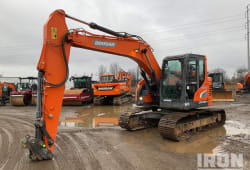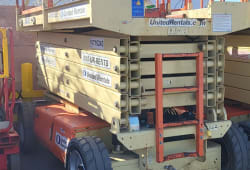An Ultimate Guide to Permeable Pavers: Benefits, Uses, and Materials
6 Lectura mínima
)
septiembre 12, 2023
In the realm of sustainable construction and landscaping, the permeable paver system has emerged as a groundbreaking solution to combat soil erosion and manage stormwater effectively. Permeable pavers offer many advantages, making them popular for various applications. This comprehensive guide will explore what permeable pavers are, their uses, and the pros and cons of choosing this innovative technology.
What are Permeable Pavers?
Permeable pavers, often called permeable paving systems, are specialized pavement solutions designed to allow water to pass through their surface and into the ground beneath. Unlike traditional concrete pavers, which are impervious, permeable pavers are carefully engineered to create a porous surface that promotes efficient water infiltration. This innovative solution is especially valuable in areas prone to soil erosion and flooding.
:format(webp))
How Do Permeable Pavers Work?
Permeable pavers utilize various materials, such as porous interlocking concrete pavements, pervious pavers, and permeable concrete pavers. These materials are laid over a base layer that typically comprises crushed stone or gravel. The combination of the porous surface and the underlying stone layer allows water to permeate through the pavement, reducing runoff and promoting groundwater recharge.
Uses of Permeable Pavers
Permeable pavers are a versatile solution with a wide range of applications, making them a valuable choice for various construction and landscaping projects. Below are some common uses of permeable pavers:
1. Permeable Driveways
Permeable driveways have become an eco-friendly alternative to traditional concrete or asphalt driveways. They also function better than the conventional "eco-friendly" pervious concrete option of a grass driveway.
By using a permeable driveway, homeowners can prevent excessive runoff, reduce the risk of soil erosion, and enhance the aesthetic appeal of their properties.
:format(webp))
2. Sustainable Parking Lots
Commercial and public parking lots are often surfaced with impermeable materials, contributing to stormwater runoff problems. Using permeable pavers in parking lots helps mitigate these issues, reducing the burden on municipal drainage systems and minimizing pollution in local water bodies.
3. Walkways and Patios
In residential and commercial landscapes, permeable pavers are an excellent choice for walkways, patios, and outdoor entertainment areas. These surfaces provide a stable and attractive foundation while allowing rainwater to infiltrate, which can prevent puddles and muddy areas.
4. Green Infrastructure
Permeable pavers play a crucial role in green infrastructure projects. They can be used in rain gardens, bioswales, and other sustainable stormwater management systems to capture and filter runoff, reducing the risk of flooding and improving water quality.
5. Road Construction
Some municipalities are incorporating permeable pavers into road construction projects. While unsuitable for high-traffic highways, permeable pavers can be used on less-traveled roads to manage runoff and prevent erosion.
:format(webp))
Pros of Choosing Permeable Pavers
Adopting permeable pavers offers several benefits, making them an attractive choice for residential and commercial applications. Let's delve into the advantages of using permeable pavers:
1. Stormwater Management
One of the primary benefits of permeable pavers is their ability to manage stormwater effectively. By allowing water to infiltrate the ground, these surfaces reduce runoff, preventing flooding and minimizing the strain on municipal drainage systems like storm drains.
:format(webp))
2. Soil Erosion Prevention
Permeable pavers act as a barrier against soil erosion. They provide a stable surface that helps hold soil in place, even during heavy rainfalls or when subjected to vehicular traffic. This is especially beneficial for areas prone to erosion.
:format(webp))
3. Improved Water Quality
As rainwater filters through the porous surface and underlying stone layers, it undergoes natural filtration, removing impurities and pollutants. This process leads to improved water quality in local aquifers and water bodies.
4. Reduced Heat Island Effect
Traditional asphalt and concrete surfaces absorb and radiate heat, contributing to urban heat islands. Permeable asphalt, however, allows water to cool the surface through evaporation, reducing heat retention in urban areas.
5. Aesthetically Pleasing
Permeable pavers come in various colors, shapes, and patterns, providing design flexibility. They can enhance the visual appeal of driveways, walkways, and other outdoor spaces while maintaining their functionality.
:format(webp))
6. Compliance with Regulations
Local regulations and zoning codes require sustainable stormwater management practices in many areas. Choosing permeable pavers can help property owners comply with these requirements while contributing to environmental conservation.
Cons of Choosing Permeable Pavers
While permeable pavers offer numerous advantages, it's important to consider some potential drawbacks before deciding to use them:
1. Installation Costs
Permeable pavers and their installation can be more expensive than traditional options like concrete or asphalt. The need for specialized skills and equipment may also increase upfront costs.
2. Maintenance Requirements
Permeable pavers require regular maintenance to ensure their effectiveness. This includes periodic cleaning and debris removal to prevent clogging of the pores. Neglecting maintenance can reduce their permeability over time.
:format(webp))
3. Limited Load-Bearing Capacity
Permeable pavers are unsuitable for areas with heavy vehicular traffic, such as highways or industrial yards. They may not withstand the weight and stress of large trucks or machinery.
:format(webp))
4. Freezing and Thawing
In regions with freezing and thawing cycles, permeable pavers may be susceptible to damage as water trapped in the pores can expand and contract, potentially causing cracks or shifting.
:format(webp))
5. Learning Curve
Designing and installing permeable pavers may require specialized knowledge and training. Working with experienced professionals is essential to ensure the pavement functions as intended.
Choosing the Right Permeable Paving Materials
The effectiveness of permeable pavers largely depends on the choice of materials. Some commonly used permeable paving materials include:
Permeable Interlocking Concrete Pavements: These are concrete pavers with voids or gaps that allow water infiltration. They offer durability and design versatility.
Permeable Pavement: Made from concrete, plastic, or other materials, these pavers have openings between them that facilitate water flow. They come in various shapes and sizes.
Permeable Concrete Pavers: These are traditional concrete pavers designed with permeability in mind. They combine the strength of concrete with the benefits of permeability.
Conclusion
In conclusion, permeable pavers are a valuable solution for managing stormwater, preventing soil erosion, and contributing to environmental sustainability. While they may have drawbacks, their numerous benefits make them a compelling choice for various applications, from residential driveways to commercial parking lots and green infrastructure projects.
When considering permeable pavers, it's essential to assess your specific needs, budget, and local conditions to determine if they're the right choice for your project. With proper planning and maintenance, permeable pavers can be an eco-friendly and aesthetically pleasing addition to your property.

Samir Shah is the Co-Founder and Chief Product Officer of Boom & Bucket, where he leads the development of innovative solutions for buying and selling heavy equipment. With a background in engineering, product development, and business strategy, Samir has a track record of taking companies from concept to market success. Previously, he was the Head of Cat Digital Labs at Caterpillar, overseeing digital initiatives and product launches. He holds degrees from MIT Sloan and Carnegie Mellon, and he is passionate about tackling big challenges in underserved industries.











